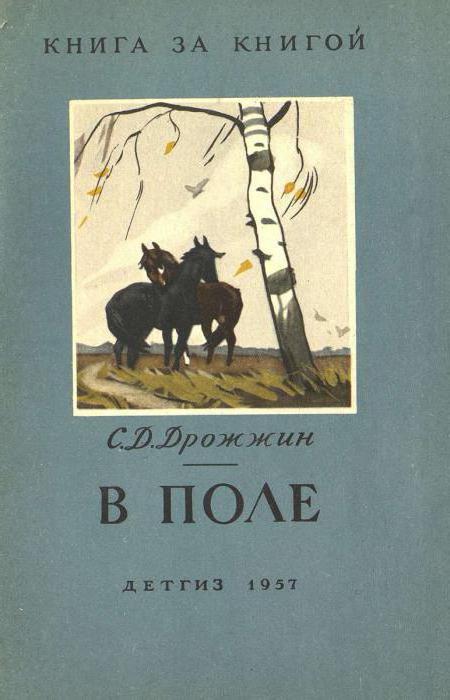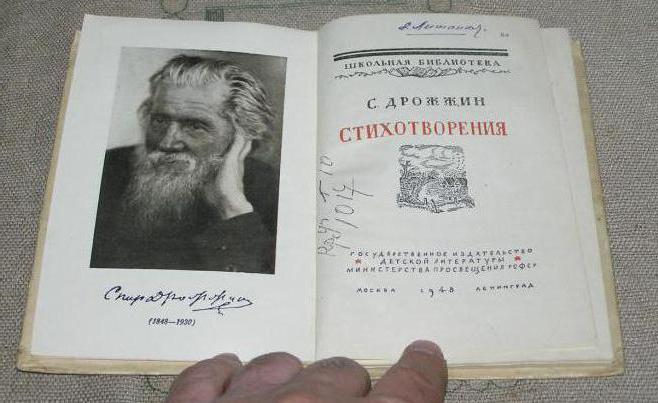Spiridon Dmitrievich Drozhzhin is a famous Russian poet, whose poems were very popular both in the pre-revolutionary years and in the times of the USSR. He lived a long life, the bulk of which he devoted to literary creation. The biography of Spiridon Dmitrievich Drozhzhin is summarized in this article.
Origin, years of study
He was born on December 6, 1848 in the Tver province (Nizovka village). This region was very fond of Spiridon Dmitrievich Drozhzhin. His homeland was praised in many of his works. The village of Nizovka will subsequently become a source of inspiration for the poet for many years. Spiridon Dmitrievich Drozhzhin dedicated, in particular, his famous poem to the Motherland.
The parents of the future poet were serfs. Spiridon Dmitrievich received the basics of education from his grandfather, Drozhzhin Stepan Stepanovich, who taught him how to read the ABC and, of course, the watch book.
In 1858, Spiridon was sent to school to the local clerk. Here, the future poet studied writing and writing for two years. Spiridon Dmitrievich Drozhzhin gratefully recalled these days. They devoted his poem of 1905, "At the school of the clerk." At this, the training of Spiridon Dmitrievich was completed - in the winter of 1860, the future poet went to St. Petersburg to earn money.
Wandering around the country, self-education
The next 36 years of his life are marked by painful wanderings around the country. Spiridon Dmitrievich changed many professions. He was a restaurant servant, a bartender's assistant, a clerk in bookstores and tobacco shops, a salesman, a delivery man, a footman, a laborer, an agent of the Samolet shipping company, who was entrusted with the delivery of firewood for the railway. Fate cast the future poet in Tver and Moscow, Kharkov and Yaroslavl, Tashkent and Kiev.
The initial years of wandering, St. Petersburg (1860-1871 gg.), - a time marked not only by a half-starving beggarly existence, but also by the active self-education of Drozhzhin. The first four years spent in the capital, he worked sexually in the Kavkaz tavern. At this time, Spiridon Dmitrievich Drozhzhin eagerly, albeit unsystematically, read literature, often of poor quality: magazines such as Readings for Soldiers and Mirsky Messenger, popular novels, etc. However, after a while Spiridon Dmitrievich got acquainted with the works of I.S. Nikitina, A.V. Koltsova and N.A. Nekrasov. He enthusiastically read the magazine Iskra. Since 1866, Spiridon Dmitrievich began to regularly visit the Public Library.
Own library and first poem
His ideological and aesthetic orientation and artistic tastes were positively influenced by Drozhzhin’s acquaintance with metropolitan students and representatives of non-democratic youth. Saving in clothes and food, Spiridon Dmitrievich Drozhzhin assembled his library. It included works created by his favorite authors: M. Yu. Lermontov and A. S. Pushkin, Nikitin and Koltsov, P.-Zh. Beranger and G. Heine, G. I. Uspensky and L. N. Tolstoy, N. P. Ogarev and F. Schiller and others. Drozhzhin was also interested in “forbidden” literature. At the age of 17, he created his first poem. Since that time, Spiridon Drozhzhin did not stop writing poetry. The first entries in his diary appeared on May 10, 1867. He led him to the end of his life.
First post
By 1870, Drozhzhin's first attempt was to publish his works. He sent the 5 best, in his opinion, poems to the Illustrated Newspaper, but they were rejected. In 1873, the poet's long-awaited literary debut took place. It was then that Drozhin's poem "Song about the sorrow of the good fellow" was published in the magazine "Literate". Since that time, Spiridon Dmitrievich began to be actively published in many magazines (Russian Wealth, Family Evenings, Delo, Slovo, etc.), as well as in children's publications (Young Russia, Zhavoronok, Children's reading "," Children's years ", etc.).
Fame, homecoming
Fame Drozhzhina as a poet in the late 1870 - 1880s. growing fast. OF. Surikov showed interest in a young self-taught author. This is evidenced by their correspondence dating back to 1879.
In St. Petersburg in 1889, the first collection of S.D. Yeast ("Poems of 1866-1888. With the notes of the author about his life"). In 1894 and 1907, this book was reprinted, each time significantly replenished. Nevertheless, the poet continued to be poor. At the beginning of 1886, Drozhzhin finally returned to his native village of Nizovka. Here he devoted himself entirely to literature as well as agricultural work. L.N. Tolstoy supported the decision that Spiridon Dmitrievich Drozhzhin made. The homeland, as he believed, could inspire the poet to new achievements.
Meeting with L. N. Tolstoy and R. M. Rilke
Drozhzhin met with Lev Nikolaevich twice, in 1892 and 1897. For the poet in the village, the police established covert surveillance, which did not prevent him from creating. The poet Spiridon Dmitrievich Drozhzhin became more and more popular. His biography was marked by an important event in 1900: R. M. Rilke, the great Austrian poet, arrived in Nizovka. He translated into German 4 poems by Spiridon Dmitrievich.
New books, improving financial standing
One after another in the first decade of the 20th century, the following books of Drozhin are published: in 1904 - "New Poems", in 1906 - "The Year of the Peasant", in 1907 - "Treasured Songs", in 1909 - "New Russian Songs" and "Bayan" . The circle of Writers from the People in December 1903 spent an evening in Moscow, dedicated to the thirty years of creative activity of Drozhzhin. In the same year he was assigned a pension (180 rubles a year, for life).
In 1904, Spiridon Dmitrievich Drozhzhin wrote his famous poem "Homeland". The author has always had a special feeling for the land on which he was born. Many of his works are devoted to this.
In 1905, Drozhzhin became a member of the Society of Lovers of Russian Literature organized at Moscow University. And in 1910, on December 29, he received a prize from the Russian Academy of Sciences. Its size was 500 rubles. She was awarded to Drozhzhin for collections of 1907-09. On October 19, 1915, another book by Spiridon Dmitrievich, “Songs of the Old Plowman” (published in 1913), was noted by the Academy of Sciences. Drozhzhin was awarded the honorable "Pushkin" review.
Condemning the imperialist war and supporting the October Revolution
Living in the village, Spiridon Dmitrievich followed important events in the life of society. He became one of the few Russian writers who categorically condemned the imperialist war. In 1916, a poem appeared Drozhzhina "Down with the war!". Her bloody events in 1914 called Spiridon Dmitrievich Drozhzhin in his diary a "remnant of gross barbarism".
His biography is marked by the adoption of the October Revolution, which the 69-year-old poet met with joy. He immediately began to participate in community service. Drozhzhin was a member of the volost executive committee; he traveled throughout the country and read his works to local residents. The poet in 1919 became the chairman of the congress of proletarian writers in the Tver province. Poems of Spiridon Dmitrievich Drozhzhin continued to be published in print.
"Songs of labor and struggle"
In 1923, his collection appeared, entitled "Songs of Labor and Struggle." He marked immediately two anniversaries of the poet - the 75th anniversary of his birth and the 50th anniversary of his creative activity. On the occasion of these dates, Spiridon Dmitrievich was elected an honorary member of the then All-Russian Union of Poets. In addition, the library-reading room named after Drozhzhin appeared in Tver. 5 years later, on the occasion of the 80th anniversary, Spiridon Dmitrievich received congratulations from the USSR Academy of Sciences. It was signed by A.P. Karpinsky, its president.
last years of life
September 28, 1928 Drozhzhin met with Maxim Gorky in Moscow. In the last years of his life, Spiridon Dmitrievich worked on the following collections: "Songs" (published in 1928), "Road Roads" and "Songs of the Peasant" (both - 1929). "Songs of the Peasant" became the last book of the poet, published in his lifetime. Also Drozhzhin prepared for publication a four-volume "Complete Works". In addition, he brought the Notes on Life and Poetry to 1930.
The poet died in his native Nizovka at the age of 82. This concludes the biography of Spiridon Dmitrievich Drozhzhin. Let us briefly talk about his creative heritage.
Features and significance of the work of Drozhin
The ashes and the house in which the poet lived the bulk of his life were transferred to the village of Zavidovo (Kalinin Region) in 1938. Here is the memorial museum of the poet, where to this day many admirers of his talent come.

The creative journey of Spiridon Dmitrievich was very long, more than 60 years. He was also unusually fruitful. Drozhzhin published 32 collections during his lifetime, 20 of which - until 1917. It should be noted that the verses of Spiridon Dmitrievich Drozhzhin as a whole are artistically unequal. Nevertheless, in the best part of the heritage of this author, skill and original talent are revealed. In the works of Drozhzhin noticeable influence of poets such as Nekrasov, Nikitin and Koltsov. In several of his works dating back to the 80-90s, echoes of Nadson S. Ya. Poetry are heard. Sincerity, spontaneity, sincereness and simplicity - these are the main qualities that marked the poems of Spiridon Dmitrievich Drozhzhin. He can be called a singer of peasant life. That is how he defined the essence of his calling from the first steps in literature (My Muse, 1875).

A number of works by this poet entered folklore (Songs of Workers, Song of the Soldier). Many of his poems were put to music by such composers as V. Ziring, S. Evseev, A. Chernyavsky, N. Potolovsky, F. Lasek and others. F. I. Chaliapin sang two songs to the verses of such a poet as Drozhzhin Spiridon Dmitrievich .
The biography for children and adults, outlined in this article, gives only superficial ideas about his work. It is best to turn directly to poems in order to understand the meaning and features of the poetry of Spiridon Dmitrievich.